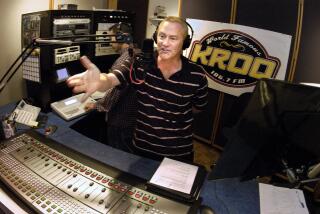KROQ Caught Between Rock and a Hard Place
- Share via
Is KROQ-FM ready to make a weighty change in its format . . . weighty as in heavy-metal?
If you believed the rock rumor mill, you’d think KROQ--once L.A.’s hippest radio outlet and a key influence on national programming trends--could be going in any musical direction. After an 18-month rating slump, KROQ has slipped to a lowly No. 16 in the latest Arbitron ratings, shaken up its programming staff, fired longtime afternoon-drive deejay Dusty Street and replaced many of its techno-pop dance tunes with current hits by Guns N’ Roses, Faith No More, Tom Petty and (gasp) the Rolling Stones.
New station manager Trip Reeb didn’t mince words: “I think one of the biggest mistakes this station ever made was not playing the Guns N’ Roses album when it came out two years ago. And we won’t make that mistake again. We’re going to be a rock station--a station playing harder-edged, guitar-oriented music.”
Call it Rock of the ‘90s. “If we come across the right new metal song, which we feel crosses over to our audience, we’ll play it,” said Reeb, who came to KROQ from 91X, San Diego’s hip rock outlet. “When I first got here, I asked the question--why not play Metallica? Why not play Soundgarden? Those are hip, musically adventuresome bands, which is exactly what KROQ has always been about.”
Don’t worry--KROQ isn’t aiming for the Hair Brigades. “I don’t care how many records they sell--you’re never going to see us play Bon Jovi,” Reeb promised.
But the times they are ‘a changing. By the mid-1980s, KROQ had grown from a tiny underground rocker to an L.A. powerhouse. Under the tutelage of program director Rick Carroll, The ROQ eclipsed cobwebby album-rock outlets such as KLOS-FM and the late KMET-FM with a potent combination of sassy deejays, a post-punk playlist and a hip attitude that embraced every ditzy new trend popular with L.A.’s style-conscious teens.
By last year, the hot streak was over. Plagued by a troubled personal life, Carroll was rarely around (he died last July after a brief illness). Without a firm hand at the helm, the station lost touch with its notoriously fickle youthful audience.
If anything, the station was a victim of its own success. When KROQ was sold for a record $45 million in 1986, it became obvious that L.A. rock radio had enormous profit potential. As heavy-duty competitors such as Power 106 and KQLZ-FM (Pirate Radio) jumped into the market, KROQ was forced to compete against better-financed rivals, each armed with splashy contest give-aways and huge marketing budgets.
As each new station arrived, it borrowed the most accessible items from KROQ’s format. Meanwhile, the station’s house bands--Oingo Boingo, the Cure and the B-52’s--graduated to pop stardom and Top 40 radio.
“If someone told you 18 months ago that the Cure would sell out Dodger Stadium and get played every night on KIIS-FM,” said Reeb, “you’d have thought they were nuts. Now you can hear them everywhere.”
Reeb says KROQ was especially hurt by Pirate Radio (Home of the Power Ballad), which has snatched a huge chunk of KROQ’s young male audience. “They marketed themselves superbly,” he said. “They came in with a rebellious, we’ll-do-anything attitude that was--well--our attitude.”
Reeb isn’t taking the loss of his key rock listeners lying down. He’s brought in a sharp, 25-year-old program director, Andy Schuon, a “radio fanatic,” who’ll help give the station a strong sense of on-air production. Reeb is also toning down his air staff: “Honestly, I think our jocks talked too much. Over the music. Into the music. They talked a lot!
“I hate to use the MTV analogy, but we’d like to give the station the same striking audio image that MTV has done with its visual image. We want to create a whole attitude--and environment --that captures what KROQ is all about--nutty, off-beat and unpredictable.”
KROQ’s deejays are hoping for the best. “They had to do something with the ratings so down lately,” said The Poorman, the station’s 9 a.m. to noon deejay. “We’re all hoping this will be the answer. I’m sure people are saying KROQ may have run its course. But I’m the eternal optimist. I think if we can play the right music, we can make a comeback.”
Dusty Street, who had been at KROQ for eight years, was less optimistic. “Everyone’s shaking in their boots over there,” said Street, who claimed she was fired because she had “too strong of a personality.”
“Disc jockeys no longer have any voice. They might as well hire people with no ears. By the end of the year, I doubt seriously the station will resemble what KROQ used to be.”
Reeb disagreed. “I think there’s only been a big uproar because I came in and did everything at once. Dusty is very talented. But she’s a renegade. And I couldn’t see her adjusting to the way we wanted to handle the format.
“But it’s not the radical departure people think. The station had just become too limited by the dance-oriented
format. We want to keep our loyal listeners--and add a new generation of listeners too. The way to do that is not to forsake the bands that have always had a special place at KROQ. But pop music is constantly changing--and we want to change with it.”
More to Read
The biggest entertainment stories
Get our big stories about Hollywood, film, television, music, arts, culture and more right in your inbox as soon as they publish.
You may occasionally receive promotional content from the Los Angeles Times.










